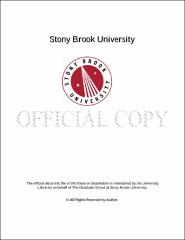| dc.identifier.uri | http://hdl.handle.net/11401/77623 | |
| dc.description.sponsorship | This work is sponsored by the Stony Brook University Graduate School in compliance with the requirements for completion of degree. | en_US |
| dc.format | Monograph | |
| dc.format.medium | Electronic Resource | en_US |
| dc.language.iso | en_US | |
| dc.publisher | The Graduate School, Stony Brook University: Stony Brook, NY. | |
| dc.type | Dissertation | |
| dcterms.abstract | Squamous cell carcinoma antigens (SCCAs) are members of the serpin family of endogenous serine/cysteine protease inhibitors. First identified in the serum of a patient with squamous cell carcinoma of the uterine cervix, both SCCA1 and SCCA2 have now been found to be elevated in cancers of the lung, head and neck, and liver. Despite SCCA's long known involvement with human cancer, little is known about SCCA's functional role within tumor development and progression. I began my study examining SCCA expression in numerous epithelial cancers. In assessing 1,300 breast cancer samples, SCCA expression was found to correlate with high-grade, advanced-stage cancers. Furthermore, SCCA-positivity predicted both a worse overall survival and recurrence-free survival. My study then turned to dissecting SCCA's oncogenic regulation within human cancers. After an initial screen, I identified oncogenic Ras-mediated up-regulation of SCCA that is dependent on MAPK signaling and the Ets family transcription factor PEA3. Downstream of oncogenic Ras, SCCA expression leads to inhibition of protein turnover, unfolded protein response (UPR), activation of NF-kB transcription factors, and production of proinflammatory cytokines. Analysis of human colorectal and pancreatic cancer patient samples revealed a positive correlation between Ras mutation, enhanced SCCA expression, and proinflammatory cytokine production. Lastly, silencing of SCCA impairs proinflammatory cytokine production and xenograft tumor growth of pancreatic cancer cells. These findings uncover SCCA as a Ras-responsive factor that plays an essential role in Ras-mediated secretory response, and offers new insight on the regulation of oncogene-associated cytokine production in human malignancy. | |
| dcterms.available | 2017-09-20T16:53:03Z | |
| dcterms.contributor | Zong, Wei-Xing | en_US |
| dcterms.contributor | Crawford, Howard | en_US |
| dcterms.contributor | Moll, Ute | en_US |
| dcterms.contributor | Chen, Emily | en_US |
| dcterms.contributor | Bar-Sagi, Dafna. | en_US |
| dcterms.creator | Catanzaro, Joseph Michael | |
| dcterms.dateAccepted | 2017-09-20T16:53:03Z | |
| dcterms.dateSubmitted | 2017-09-20T16:53:03Z | |
| dcterms.description | Department of Genetics. | en_US |
| dcterms.extent | 126 pg. | en_US |
| dcterms.format | Monograph | |
| dcterms.format | Application/PDF | en_US |
| dcterms.identifier | http://hdl.handle.net/11401/77623 | |
| dcterms.issued | 2014-12-01 | |
| dcterms.language | en_US | |
| dcterms.provenance | Made available in DSpace on 2017-09-20T16:53:03Z (GMT). No. of bitstreams: 1
Catanzaro_grad.sunysb_0771E_11727.pdf: 15135009 bytes, checksum: fcadf43676290428d538f98f3dafada7 (MD5)
Previous issue date: 1 | en |
| dcterms.publisher | The Graduate School, Stony Brook University: Stony Brook, NY. | |
| dcterms.subject | Inflammation, Oncogenic Signaling, Pancreatic Cancer, Ras, SCCA, Serpin | |
| dcterms.subject | Molecular biology | |
| dcterms.title | Role of squamous cell carcinoma antigen (SCCA) in oncogenic Ras-mediated tumorigenesis | |
| dcterms.type | Dissertation | |

